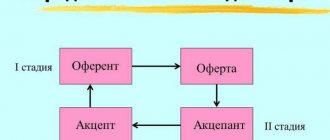What is an offer
An offer is an offer to enter into an agreement. An offer may look different, here are examples:
- A document in the basement of an online store with sections on ordering, delivery and payment for smartphones.
- Instructions on the website on how to activate the accounting program.
- Poster in a barbershop with a list of services and prices.
- Photos of clothes on Instagram with sizes and price tags.
- An email to a client offering discounted marketing services.
- Rules for visiting the gym at the counter where they sell memberships.
- The inscription on the chalk sign in front of the coffee shop “Coffee for 100 ₽ from 7 to 9.”
The main thing is that the offer must spell out the essential terms of the contract. That is, there should be no questions about what is being offered and at what price.
An offer turns into a contract at the moment of its acceptance.
Acceptance is agreement to a contract. What is considered acceptance is usually written in the offer itself. Sometimes this is already written in the law. Acceptance can be any action of the client, but most often it is considered payment.
Offer + acceptance = contract . No papers, signatures or seals are needed. To put it bluntly, offer and acceptance are equivalent to a conventional paper contract. After acceptance, both parties are obliged to fulfill the agreement, and it is no longer possible to change anything on the fly. If it comes to a dispute, the rules from the law for a specific type of contract will apply. Here are examples of acceptance:
- The buyer made an electronic payment for the smartphone → a purchase and sale agreement was concluded.
- The user downloaded the program → concluded a license agreement.
- A man signed up for a beard trim → signed a contract for services.
- The woman wrote in direct message: “I’m ready to buy this sweater” → a purchase and sale agreement was concluded.
- The client wrote back that he was ready to cooperate → we signed a contract for services.
- The young man bought an annual membership to the gym → signed a contract for services.
- The girl handed over a hundred-ruble bill with the words “I’ll have some coffee” → a purchase and sale agreement was concluded.
Acceptance must be unconditional. If a client writes that he wants a market analysis, but at a discount, and also SEO for the site, this is not acceptance and the contract has not taken place. You can relax: further correspondence does not oblige you to anything. However, the client may agree, but clarify the details or correct typos. Such little things do not affect acceptance. Here it is considered that the contract has been concluded.
Silence and complete inaction are not acceptance. On the contrary: if the client does not respond or does not transfer money, the contract is not concluded.
You can also respond to the offer through conclusive actions . The client does not write in black and white “yes, let’s go,” but immediately executes the contract on the proposed terms. That is, he shows by his behavior that he agrees. For example, he sends material for analysis. Or stands in line for coffee.
If an entrepreneur sells a product or service through a website to any visitor, it is better to make the offer publicly available in the form of a separate document. This way everyone will understand the rules for ordering, delivery and returns. Equally important, clear rules will protect you in disputes with clients and during inspections by Rospotrebnadzor.
Public offer and other documents for the site
What is an offer?
In Articles 435 - 449 of the Civil Code of the Russian Federation, which are specifically devoted to issues related to the offer, there is a direct indication that the contract will be considered concluded only if the condition is met that a specific offer made by one person must be accepted by another. One of the important conditions of the offer is the mandatory content of contractual terms that are essential.
As for the format of the offer, it can be different: written, oral, or in the form of a fax, telegram, or draft agreement.
The offer is especially popular in business circles.
You can find more complete information on the topic in ConsultantPlus. Full and free access to the system for 2 days.
When a contract on paper cannot be replaced by an offer
There are two cases when you will need a paper agreement with signatures. And with him there are negotiations on the terms. These are the cases:
- The client receives an atypical service . For example, a fitness club operates on an offer to visit the gym. Visitors come, pay the price and work with trainers according to a standard program. But if a trainer goes to the client’s home after an injury for an increased fee, the conditions from the offer will not apply. To protect against disputes, it is better to draw up an agreement with individual conditions: time of classes, rehabilitation program, procedure for canceling a visit.
- By law, the contract must be drawn up in one document . Most often, entrepreneurs are faced with two of them: renting and selling real estate. Under the offer, it is also impossible to conclude a corporate agreement between the participants of the LLC.
How to submit bonds for an offer?
The maturity date of bonds is agreed upon in advance by the issuer. The exact maturity dates of bonds can be found in the issue prospectus on the Moscow Exchange, through a trading terminal or on specialized Internet portals.
The latter include:
- project by the Finmarket agency at rusbonds.ru;
- information platform of the Cbonds agency, available at the link: ru.cbonds.info.
The step-by-step process for repaying the offered assets is as follows:
- A week before the start of the procedure, the issuing organization creates an announcement about the corresponding action. Moreover, the size of the coupon that will be offered after the offer is not known. As a rule, companies try to adjust bond yields to the current values of similar issues.
- Three days before the end of applications, investors must submit an application to present assets for redemption by the issuer. This procedure can be completed by engaging a broker or remotely through consultants.
- After the maturity date has passed, within a few days all the investor's assets mentioned in the application are debited from the account.
- Funds for sold securities are credited to the depositor's account no later than 25 days from the date of closing of the offer.
The timing of the transfer of funds for redeemed bonds may vary depending on the issuer. Corporate companies provide services to the customer for transferring funds faster than federal or municipal authorities.
Public and non-public offer
There are two types of offers. It depends on the goal of the entrepreneur: to conclude an agreement with everyone or with a specific person.
A public offer is an offer to conclude an agreement with anyone who responds. Displaying a product, sending an email, describing services on a website is all a public offer. If an entrepreneur sells retail, runs public catering or provides personal services, his proposals are considered a public offer.
The peculiarity of a public offer is that the client cannot be refused. An entrepreneur is obliged to sell a smartphone, pour coffee and cut a haircut for any consumer. For discrimination based on health and age, you can even receive a fine of up to 500,000 rubles under Art. 14.8 Code of Administrative Offenses of the Russian Federation.
But writing in a public offer about a discount for certain clients is legal. For example, for students, families with many children or holders of discount cards.
A non-public offer is an offer to a specific person.
Only the addressee can respond. A personal message from a client offering a marketing analysis for RUB 3,000 is a non-public offer. The entrepreneur is not obliged to cooperate with the rest for this money, because he did not offer or promise.
Goals and general concepts
The main goal of the offeror is not only to initiate a conclusion, but to conclude a deal.
An acceptor is a person who has accepted the proposal to conclude a contract and all its terms.
An offer, as a rule, is in writing and contains the main terms of the upcoming transaction. A striking example is a regular invoice, which contains:
- goods that are planned to be purchased by the acceptor;
- quantity of goods;
- price;
- payment deadline.
The invoice may even contain information about containers or packaging, payment terms, for example, 50% prepayment.
When to write “the proposal is not a public offer”
This phrase is written to distinguish between a public offer and advertising. But this is walking on thin ice.
A public offer offers to buy a specific product or service at a price tag. Her goal is to sell here and now to anyone who responds. You can't refuse those who want to.
Advertising draws attention to the product. The seller wants as many people as possible to want to buy the product. An advertisement becomes a public offer if it contains an accurate description of the product and price. Without specifics, advertising remains just advertising and does not bind the seller to an agreement.
The phrase “the offer is not a public offer” does not cancel the obligation to sell the product to anyone if the product is specifically described in the advertisement. This is approximately what the judges said in case No. 33-16812/2018. This phrase can only be used for reinsurance.
To prevent an advertisement from becoming a public offer, it should look something like this. The seller says: “Look what product I have. If you’re interested, I’ll tell you on what terms I’m selling.”
An example when an advertisement is not an offer
The man saw on the car dealership’s Instagram an offer to exchange his old car for a new one without additional payments. But when I arrived at the car dealership, the managers refused to exchange it. (From the court decision we ourselves did not really understand why









